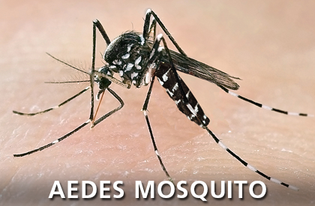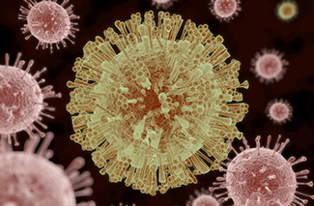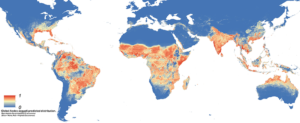ZIKA VIRUS & Aedes Mosquitoes

What is ZIKA?


Important Facts about the Aedes Mosquito and the Zika Virus.
What is Zika?
- This is an infectious disease caused by the Zika Virus, which is transmitted to people through the bite of an Aedes mosquito. Only one of five people infected with the virus develop symptoms, but when symptoms present themselves they include fever, rash, joint pain, red eyes (conjunctivitis). A definitive link to increased infant mortality and to the birth defect, Microcephaly or Small Head Syndrome, in newborns, has not been completely verified by the scientific community but results of studies are leaning toward its affirmation.
- Zika is not spread through casual contact such as touching or kissing. It cannot be caught by being in close proximity to someone exhibiting symptoms. It is not contagious in this manner. Recently, it has been reported to have been transferred through sexual contact by persons who were infected while visiting or living in an area where Zika was prevalent.
- Most people fully recover without severe complications, and hospitalization rates are low. To date, there have been no reported deaths associated with Zika virus. The incubation period is typically between 2 and 7 days before symptoms present themselves. Infection lasts, like the common cold, 10 to 21 days (these figures vary depending on the expert cited).
- Zika virus is primarily transmitted to humans through bites from two species of Aedes mosquitos, the a. aegypti (Yellow Fever Mosquito) and the a. albopictus (the Asian Tiger Mosquito), (the Culex mosquito that transmits West Nile virus is also suspect) which often live around buildings in urban areas and are usually active during daylight hours (peak biting activity occurs in early mornings and late afternoons and multiple bites from one mosquito are common).
- Aedes mosquitoes don’t fly more than a few hundred feet during their lives; Zika travels from city to city and country to country when infected people get on cars, buses, trains, and planes and come into contact with more aedes mosquitoes. Infection becomes a vicious cycle: mosquito to man to mosquito.
- Incubation time in mosquitoes: Studies show that the incubation time for ZIKA virus in mosquito vectors is approximately 10 days. After this time the virus starts to break down due to the mosquitoes own immune system.
- There is no widely available test for Zika infection. Because it is closely related to dengue and yellow fever, it may cross-react with antibody tests for those viruses. To detect Zika, a blood or tissue sample from the first week in the infection must be sent to an advanced laboratory, currently the CDC Arbovirus Diagnostic Lab or a few state health departments, so the virus can be detected through sophisticated molecular testing. The CDC is the official point of contact for physicians.
- Until more is known, CDC recommends special precautions for pregnant women and women trying to become pregnant: Pregnant women in any trimester should consider postponing travel to the areas where Zika virus transmission is ongoing. Pregnant women who do travel to one of these areas should talk to their doctor or other healthcare provider first and strictly follow steps to avoid mosquito bites during the trip.
- Women trying to become pregnant or who are thinking about becoming pregnant should consult with their healthcare provider before traveling to these areas and strictly follow steps to prevent mosquito bites during the trip.Because specific areas where Zika virus transmission is ongoing are difficult to determine and likely to change over time, CDC will update their travel notice as information becomes available. Check CDC’s Zika Travel Information website frequently for the most up-to-date recommendations.

What Zika means to those living in Southern California
In the 21st century, no place on earth is more than a day from any other place. Therefore, diseases with short incubation periods, such as Zika, have unprecedented opportunities for rapid spread through human movement. All travelers, regardless of the purpose, duration, or distance of their journey, should take steps to prevent bringing more than luggage to and from their destinations. This being said, what does the Zika outbreak in South America mean to people living in Southern California.
Southern California, being a world renowned travel destination, is prime for the introduction of diseases and viruses that infect humanity. Currently, mosquito borne viruses are in the news because of their devastating impact on human life in tropical and subtropical regions such as Africa, Southeast Asia, South America and our closest neighbor, Mexico. The newest concern, the Zika virus, has been documented only in a few people, here in California, who were infected while traveling outside the United States. This situation could change dramatically if the mosquitoes that harbor and spread this disease (and others), migrate here on imported goods, or on or inside people themselves. Infection becomes a vicious circle; Mosquito to Man to Mosquito and on and on…
Fortunately, the two mosquitos of the Aedes species, the a. aegypti and the a. albopictus, are not native to Southern California. However, since 2011 they have been detected in several California counties. So far the virus has only been detected in a few people who were infected while traveling outside the United States.
Zika is not spread through casual contact such as touching or kissing. It cannot be caught by being in close proximity to someone exhibiting symptoms. It is not contagious in this manner. Recently, it has been reported to have been transferred through sexual contact by persons who were infected while visiting or living in an area where Zika is prevalent.
Mosquito Season
Here in Southern California Mosquito season normally starts in early March or typically when temperatures reach a constant 10°C or 50° F or more. This is when female mosquitoes feel comfortable laying eggs and the eggs can mature and hatch. Combine this with wet weather and you have the perfect conditions for masses of mosquitoes. The mosquito season reaches its peak during the hot summer months. Depending on where you live, the start time of the mosquito season will vary.
When is mosquito season over? Again, the temperature plays an important factor. As the weather begins to cool, you’ll likely notice a decrease in the level of mosquito activity on your property. Non-hibernating mosquitoes will begin to die off as the temperature approaches the 50° F mark, while the hibernating species will start to seek winter refuge in hollow logs, abandoned animal burrows and other convenient hiding spots.
The first frost is usually a reliable sign of the end of mosquito season.
Prepare Before Mosquito Season Arrives
Many property owners wait until they see a swarm of mosquitoes – or until they have been bitten – to begin the mosquito control process. However, by this time, infestation has probably already occurred. The actual preparation for mosquito season should begin much earlier, before the mosquitoes have had the chance to lay eggs.
Remember, as the weather warms, the mosquito breeding cycle time shortens, which ultimately results in an increase in the number of mosquitoes on your property. This means you’ll want to get started while the weather is chilly – before the temperature consistently reaches that magical 50° F.
Mosquito Prevention
At Home:
Maintaining your property during mosquito season helps substantially. Since mosquitoes grow and multiply in standing water, make sure there are no nearby puddles or bird water feeders to attract them. Bright-colored clothing attracts bugs, so wear neutral, light-colored clothing to avoid advertising your blood. The best insect repellents are lotions or sprays containing DEET. They’re not recommended for use on infants and toddlers. For use on children consult your physician. The EPA states that DEET is safe for adults when used as directed.
For more mosquito prevention information, visit mosquito control service.
While Traveling, the CDC recommends.
There is no vaccine to prevent or medicine to treat Zika. Travelers can protect themselves by preventing mosquito bites.
- Cover exposed skin by wearing long-sleeved shirts and long pants.
- Use EPA-registered insect repellents containing DEET, picaridin, oil of lemon eucalyptus (OLE), or IR3535. Always use as directed.
- Pregnant and breastfeeding women can use all EPA-registered insect repellents, including DEET, according to the product label.
- Most repellents, including DEET, can be used on children aged >2 months.
- Use permethrin-treated clothing and gear (such as boots, pants, socks, and tents). You can buy pre-treated clothing and gear or treat them yourself.
- Stay and sleep in screened-in or air-conditioned rooms.
For more information, visit: CDC – Travel Notices – Zika
At Work:
Workers at risk of being bitten by mosquitoes are those who spend time outdoors. To reduce their risk of mosquito bites they can reduce sources of standing water, wear long-sleeved shirts and long pants and use insect repellents on exposed skin and clothing. For more information go to CDC Mosquito-Borne Diseases.
 800-901-1102
800-901-1102